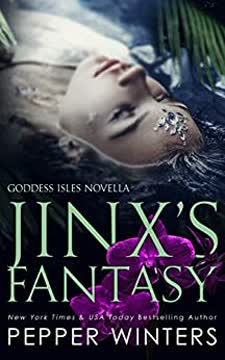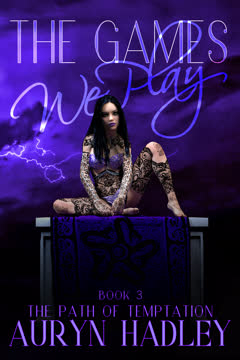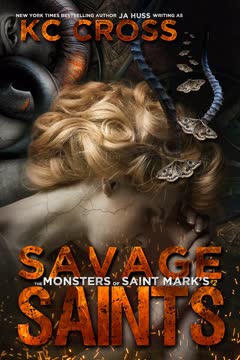Plot Summary
Storms and Strangers Return
Indie Anna Accorsi, a woman shaped by violence and secrets, returns to McKay's doorstep after years missing. She's a storm—fragile, dangerous, and unpredictable. McKay, who helped raise and train her, is both relieved and haunted by her reappearance. Indie's presence stirs up old regrets and unresolved feelings among the men who shaped her: McKay, Adam, and Donovan. She's not just seeking shelter—she's seeking answers, retribution, and perhaps a way back to herself. The emotional tension is palpable, as each character wonders if Indie's return will bring healing or destruction. The rain outside mirrors the turmoil within, and the reunion is as much about confronting the past as it is about surviving the present.
The Auctioned Girl's Fate
Fourteen years earlier, Adam Boucher attends a secretive, brutal auction on Les Fleurs Island, where girls are sold as "pets" to powerful men. Indie, only ten, is caged with a snake, her defiance and eerie calm marking her as different. Adam, jaded and searching for purpose, buys her—not for pleasure, but as a weapon, a partner, a project. Donovan, a prodigy with his own dark legacy, arranges the purchase, hoping to study and perhaps save Indie's mind. The transaction is transactional and yet deeply personal, setting the stage for a lifetime of complicated bonds. Indie's fate is sealed: she will be shaped by these men, and in turn, she will shape them, for better or worse.
Building a Family of Four
Indie's new life is a strange blend of discipline, affection, and danger. Adam is the protector and leader, McKay the gentle trainer and caretaker, Donovan the mind-healer and observer. Each man fills a different void in Indie's life, and she, in turn, becomes their obsession, their responsibility, and their undoing. The household is a fortress against the world, but also a crucible for secrets and desires. Indie's relationship with each man is unique—she is a daughter, a sister, a lover, a weapon. The lines blur as she grows, and the emotional stakes rise. The found family's unity is both their strength and their greatest vulnerability.
The Boy Next Door
Nathan St. James, the boy next door, is Indie's first friend, first love, and the only piece of normalcy in her chaotic world. Their bond is pure, forged in the Louisiana woods, away from the violence and manipulation of the Company. Nathan is everything Indie is not—gentle, open, unscarred by the Company's darkness. Their love is a refuge, but also a threat to the men who fear losing Indie's loyalty. As Indie is drawn deeper into the world of assassins and secrets, Nathan becomes both her anchor and her Achilles' heel. Their story is one of innocence lost, and the price of loving someone who can never truly be free.
Training, Lies, and Loyalty
Indie's adolescence is a relentless cycle of training, missions, and therapy. McKay teaches her to fight and survive; Adam sends her on increasingly dangerous jobs; Donovan tries to keep her sane, recording every session, searching for the roots of her trauma. The Company's collapse throws their world into chaos, and Indie's sense of self fractures. She is haunted by blackouts, missing time, and the suspicion that someone—perhaps Donovan's lost twin, Carter—has programmed her for violence. The men's love is both a lifeline and a chain, as Indie struggles to distinguish her own desires from the roles they've assigned her.
The Company's Collapse
The shadowy organization that created Indie and her "family" implodes, leaving its operatives adrift. Adam, McKay, and Donovan try to build a new life, taking freelance jobs and clinging to their makeshift family. But the loss of structure brings new dangers: old enemies resurface, and Indie's programming becomes more unstable. The outside world is no safer than the one they left behind, and the bonds that once protected them now threaten to strangle them. The collapse is both liberation and exile, forcing each character to confront who they are without the Company's rules.
Love, Secrets, and Betrayal
As Indie comes of age, her relationships with Adam, McKay, and Donovan become increasingly tangled. Love, jealousy, and forbidden desire simmer beneath the surface. Indie's longing for all three men—and their inability to let her go—leads to moments of passion, betrayal, and heartbreak. Nathan's presence is a constant reminder of what Indie can never have: a simple, honest life. The men's secrets—about Indie's origins, about their own pasts, about the Company's unfinished business—threaten to destroy the fragile peace they've built. The family is held together by lies as much as by love.
The Trigger and the Truth
Indie's blackouts and missing memories become more frequent and alarming. Donovan's therapy sessions reveal that she has been programmed with a trigger word, likely by Carter, Donovan's own twin and a master of psychological manipulation. The realization that Indie is not fully in control of her actions terrifies everyone. The men scramble to protect her—and themselves—from the possibility that she could be turned against them at any moment. The search for the truth becomes a race against time, as Indie's sense of self unravels and the threat of violence looms ever closer.
The Birthday That Broke Us
On Indie's twentieth birthday, the family's carefully constructed world shatters. Indie, under the influence of her programming, drugs the men and orchestrates a sexual encounter that blurs the lines between consent and control. Nathan arrives, discovers the aftermath, and a violent confrontation ensues. In the chaos, Indie's daughter Maggie is poisoned by berries Indie unknowingly picked, and Nathan is killed in a struggle. The trauma is so great that Donovan erases Indie's memory of the event, hoping to spare her—and the others—from the unbearable truth. But the damage is done, and the family is broken.
Amnesia, Guilt, and Escape
After the birthday disaster, Indie disappears, lost in a haze of amnesia and guilt. Each man copes in his own way: Adam hides Maggie's survival, McKay tries to track Indie, Donovan buries himself in work and regret. The house is abandoned, the family scattered. Indie's journey is a blur of lost time, shadowy threats, and the ever-present fear that she is a danger to those she loves. The men are haunted by what they did—and what they failed to do. The past is a wound that refuses to heal, and the hope of reunion seems impossibly distant.
The Lost Daughter
Unknown to most, Adam saves Maggie and raises her in secret, letting the others believe she died. This deception is both an act of love and a desperate attempt to protect what remains of their family. Maggie grows, a living reminder of both tragedy and hope. When Indie finally returns, the revelation of Maggie's survival is both a miracle and a reckoning. The family must confront the lies that have kept them apart, and decide whether forgiveness is possible. Maggie's presence is a chance for redemption—or a trigger for new conflicts.
Coming Clean
The truth about the birthday, Nathan's death, and Maggie's survival comes to light. Each character must face their own role in the tragedy: Indie's programming, Donovan's erasure of memory, McKay's complicity, Adam's secrets. The process is agonizing, but necessary. The family's survival depends on their willingness to own their mistakes and forgive each other. The act of coming clean is both a release and a burden, as the characters realize that there are no perfect people—only imperfect survivors, doing their best in a broken world.
The Return of Maggie
Adam brings Maggie home, forcing a confrontation with the past. The reunion is joyful but fraught, as old wounds are reopened and new questions arise. Indie must reconcile her love for her daughter with the guilt of having forgotten her. The men must navigate their own feelings of betrayal and relief. The family is together again, but nothing is as it was. The future is uncertain, and the threat of Carter—the shadowy manipulator behind Indie's programming—still looms. The reunion is a fragile truce, not a happy ending.
The Shadow of Carter
Carter, Donovan's twin and the architect of Indie's mind control, emerges as the true antagonist. His influence has shaped Indie's life from the shadows, and his motives are as personal as they are sinister. The family realizes that their struggle is not just with their own demons, but with a living, breathing enemy who knows their every weakness. Carter's presence forces them to unite, even as old resentments simmer. The battle for Indie's mind—and the family's future—has only just begun.
Choosing Each Other
In the aftermath of revelation and loss, the family must decide whether to stay together or go their separate ways. Indie, for the first time, is given the power to choose. She chooses all of them—Adam, McKay, Donovan, and Maggie—refusing to be defined by her trauma or her programming. The men, in turn, choose her, accepting the messiness and danger that comes with loving someone so broken and so fierce. Their love is not a cure, but it is a form of resistance against the darkness that threatens to consume them.
The Unfixable Past
The family cannot undo what has been done. Nathan is dead, Maggie's childhood was stolen, Indie's mind is scarred. The men are complicit in violence and lies. But they choose to live with the consequences, to support each other, and to keep fighting for a better future. The past is unfixable, but it does not have to define them. The act of surviving—together—is its own kind of victory. The story ends not with closure, but with the promise of continued struggle and the hope of healing.
The New Game Begins
With Maggie's return and Carter's shadow still looming, the family enters a new phase. The old games of denial and avoidance are over; now, they must face their enemies—and themselves—head on. The bonds between them are stronger for having been tested, but the threat is greater than ever. The story closes on a note of uneasy hope: the family is together, but the battle is far from over. The past cannot be erased, but the future is theirs to claim—if they can survive it.
Characters
Indie Anna Accorsi
Indie is the axis around which the story spins—a girl bred and bought for violence, yet desperate for love and belonging. Her psyche is a labyrinth of trauma, programming, and longing. She is both victim and perpetrator, child and adult, lover and killer. Her relationships with Adam, McKay, and Donovan are complex: she is their creation, their obsession, and their undoing. Indie's greatest struggle is with herself—her lost memories, her blackouts, her fear that she is irredeemably broken. Yet she is also fiercely resilient, capable of love and loyalty even in the face of betrayal. Her journey is one of self-discovery, as she fights to reclaim her mind and her future from those who would control her.
Adam Boucher
Adam is the architect of Indie's fate—a man who buys her at auction, intending to use her as a weapon, but finds himself bound to her by love and responsibility. He is both ruthless and tender, capable of violence and deep affection. Adam's relationship with Indie is fraught with power dynamics: he is her owner, her savior, her lover, and her jailer. His greatest fear is losing control—of Indie, of himself, of the family he has built. Adam's guilt over the past drives him to secrecy and manipulation, but also to acts of genuine sacrifice. He is a man at war with his own nature, struggling to do right in a world that rewards only the strong.
Core McKay
McKay is the steady hand in Indie's chaotic life—the one who teaches her to fight, to survive, to hope. He is gentle, patient, and deeply loyal, often putting Indie's needs above his own. McKay's love for Indie is pure but complicated: he is her father figure, her brother, her friend, and eventually her lover. He is haunted by the knowledge that he helped shape her into a killer, and his greatest fear is failing to protect her. McKay's relationship with Adam is equally complex—part brotherhood, part rivalry, part unspoken love. He is the glue that holds the family together, but his own wounds run deep.
Donovan Couture
Donovan is both doctor and patient—a prodigy raised in the Company, haunted by the loss of his twin, Carter. He is fascinated by Indie, seeing in her both a case study and a kindred spirit. Donovan's therapy sessions with Indie are both an attempt to save her and a way to atone for his own complicity in the Company's crimes. He is the keeper of secrets, the recorder of truths, but also a man who hides from his own feelings. Donovan's love for Indie is intellectual and emotional, but he is often paralyzed by indecision and guilt. His rivalry with Adam and McKay is rooted in both jealousy and genuine concern.
Nathan St. James
Nathan is the boy next door—the embodiment of everything Indie could have been, had she not been sold into darkness. He is gentle, kind, and steadfast, offering Indie a glimpse of normalcy and hope. Their love is pure, but ultimately doomed by the forces that shape Indie's life. Nathan's death is both a tragedy and a turning point, the moment when innocence is finally and irrevocably lost. He is a symbol of what is at stake in the battle for Indie's soul.
Maggie
Maggie is the child born of trauma and love—a living reminder of both the family's darkest hour and their capacity for redemption. Her survival is a secret, her existence a source of both joy and pain. Maggie's presence forces the family to confront their past and imagine a future beyond violence. She is the hope that something good can come from so much suffering.
Carter Couture
Carter is Donovan's twin and the architect of Indie's mind control—a master manipulator who operates from the shadows. His motives are personal and inscrutable, driven by a need for power, revenge, or perhaps simply chaos. Carter's influence is felt long before he appears, shaping Indie's actions and the family's fate. He is the embodiment of the Company's legacy: brilliant, ruthless, and utterly without conscience.
Gerald Couture
Gerald is Donovan's grandfather and a key figure in the Company's hierarchy. He represents the old world of secrets, power, and cruelty—a world that created Indie and her family, and then abandoned them. Gerald's death marks the end of an era, but his influence lingers in the systems and traumas he helped create.
Angelica
Angelica is another product of the Company—a girl like Indie, bred for violence and survival. Her fate is a cautionary tale, a glimpse of what Indie might become if she cannot break free of her programming. Angelica's brief appearances are reminders that Indie is not alone in her suffering, and that the battle for autonomy is ongoing.
James Fenici
James is a legendary Company assassin, a figure whose story haunts all the others. His descent into madness and violence is both a warning and a prophecy. James represents the ultimate cost of the Company's experiments: the loss of self, the destruction of everything good. His presence is a shadow over Indie's future, a reminder that survival is not the same as salvation.
Plot Devices
Nonlinear, Multi-Perspective Narrative
The novel unfolds through shifting points of view—Indie, Adam, McKay, Donovan—across multiple timelines. This structure immerses the reader in the characters' confusion, trauma, and unreliable memories. The nonlinear approach allows secrets to be revealed gradually, heightening suspense and emotional impact. The use of therapy session transcripts, journal entries, and flashbacks blurs the line between past and present, truth and fiction. The narrative's fragmentation is both a reflection of Indie's damaged psyche and a commentary on the impossibility of a single, objective truth.
Mind Control and Amnesia
Indie's blackouts, missing time, and trigger words are central to the plot. Her lack of agency is both a literal threat—she can be turned into a weapon against those she loves—and a metaphor for trauma, abuse, and the struggle for self-determination. The search for the source of her programming (Carter) drives the story, while the process of recovering lost memories provides the emotional arc. The device of erased or altered memory raises questions about responsibility, forgiveness, and the nature of identity.
Found Family and Polyamory
The unconventional family at the heart of the novel—three men and one woman, bound by love, sex, and shared trauma—challenges traditional notions of family and romance. Their polyamorous bond is both a source of strength and a breeding ground for jealousy, rivalry, and betrayal. The family's unity is constantly tested by secrets, shifting loyalties, and the legacy of violence. The question of whether love can heal—or simply mask—deep wounds is central to the story.
The Unreliable Narrator
Indie's perspective is deeply unreliable, shaped by trauma, programming, and self-deception. The reader is forced to question everything she says and remembers, as well as the accounts of the other characters. The use of therapy tapes, journals, and conflicting memories creates a sense of instability and doubt. The novel explores the idea that there is no single, objective reality—only competing narratives, each shaped by pain, desire, and fear.
Foreshadowing and Symbolism
The imagery of storms, snakes, and gardens recurs throughout the novel, symbolizing danger, transformation, and the loss of innocence. The auction on Les Fleurs Island, with its cages and predators, foreshadows Indie's lifelong struggle for freedom. The garden at Old Home is both a sanctuary and a site of trauma, a place where beauty and poison coexist. The act of "coming clean" is both literal (confession, therapy) and symbolic (the hope of redemption).
Analysis
Creeping Beautiful is a dark, intricate exploration of trauma, agency, and the search for belonging in a world built on secrets and violence. At its core, the novel asks whether love can redeem the irreparably broken, or whether some wounds are too deep to heal. The story's nonlinear structure and shifting perspectives mirror the characters' fractured psyches, immersing the reader in their confusion and pain. The use of mind control and amnesia as plot devices raises profound questions about responsibility, forgiveness, and the nature of selfhood. The found family at the heart of the novel is both a refuge and a crucible, testing the limits of loyalty, desire, and forgiveness. In a world where everyone is both victim and perpetrator, the act of "coming clean"—of owning one's mistakes and choosing to love anyway—is presented as the only path to survival. The novel's refusal to offer easy answers or tidy resolutions is both its greatest strength and its most unsettling quality. In the end, Creeping Beautiful is less a story of redemption than a meditation on the messy, painful, and necessary work of living with the consequences of our choices.
Last updated:
Review Summary
Creeping Beautiful is a dark, suspenseful romance novel that has captivated readers with its complex characters and intricate plot. Set in the world of "The Company," the story follows Indie and three men who raised and trained her. Readers praise Huss's masterful storytelling, mind-bending twists, and ability to keep them guessing until the end. While some found the book confusing or uncomfortable, most reviewers were thrilled by the intense, emotional journey and eagerly anticipate the next installment in the series.










